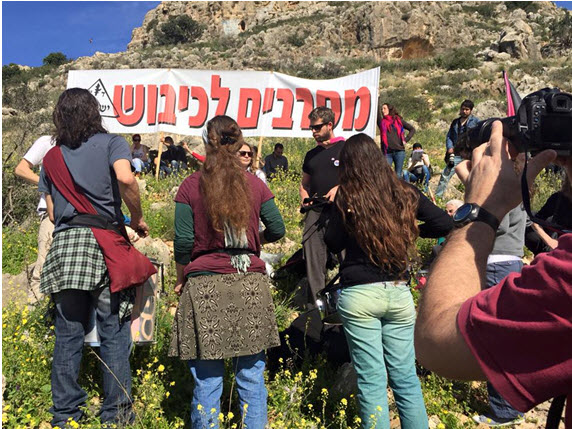Tair Kaminer, a 19-year Israeli from Tel-Aviv, received call up orders requesting her to report to the Israeli Army Induction Center (“Bakum”) in Tel Hashomer, east of Tel Aviv, on January 10, 2016. From then she has been imprisoned for refusing to serve in the army of occupation.
Sunday [February 14, 2016], 27th day in prison
Cell 6, Prison 6, Platoon 600
1:30 AM: The CO is standing at the cell door, waking me up for guard duty. I put on my uniform and submit to a full inspection, metal detector included. Another prisoner joins me for four hours of looking out over a deserted road. Time passes slowly and we are very cold. At least here we can talk, sing and laugh in relative peace.

Demonstration in solidarity with Tair Kaminer, last Saturday, February 13, in front of Military Prison 6, near Atlit (Photo: Yesh Gvul)
5:30 AM: We’re off duty. Roll call, in formation, tuck in your laces and button up your shirt. Roar: “Yes, ma’am!” “Good morning, company commander!” About face, at ease, “Two, three, close ranks!” Attention again. Always look straight ahead.
6:00 AM: We enter the mess hall in silence. Eating is obligatory, even if you’re not hungry. We stand facing the staff table. Don’t look at it, look straight ahead. Don’t make a sound when you move your chair. No talking, no smiling even. If you want something that’s at the other end of the table you have to raise your hand to call the kitchen patrol. When you’re done you put your hat on your head, your hands on your knees and your feet on the ground. Once your hat is on, no more moving; Is that clear? Yes ma’am!
7:00 AM: Break. “Why are you here?” “I refused to join the army.” Not everybody likes the idea, but we have some things in common. All the girls here hate the State and the army. “Don’t do [alternative] National Service,” they say, “this state that screws you over and sends you to prison doesn’t deserve a minute of your time.” At first I thought I would be hated, marked, but these conversations are a breath of fresh air. Then we clean the cell.
8:00 AM: A moment to spare for reading. We are to sit in the cell in full dress. No sleeping, no feet on the bed. You can sit and watch TV. I was surprised to find out that every cell in Prison 6 has a TV. You can talk quietly. I read a book.
12:00 PM: Roll call with the sergeant and another briefing for mess. Then, at break again, we continue the previous conversation: why am I here?
Prison isn’t easy: conditions are tough, CO’s are unpleasant, no cell phones or access to the outside world at all. The discipline, the cold, the fatigue, the fear of getting in trouble for nonsense like an open shirt button, the mere knowledge that you are behind lock and key, physically prevented from leaving. All that is hard, but the hardest experience so far has been a conversation with cellmates who argued for killing all the Arabs, for “doing a Holocaust on them”. And not in seditious tones or in the heat of argument; these are things said calmly, after consideration by girls I know to be sweet and smart. Am I too naive? It was a scary situation.
It still gives me the shivers. I need to go on fighting, because now I understand things are worse than I thought. Sometimes it’s hard to remember that I’m not in here because I did something wrong, but because I chose to fight against something terrible. I’m one of a group of people who care about our country and about human beings. Our fight will be long, but we can’t stop until we succeed. I am part of the struggle against the occupation. It’s part of the struggle for peace, for democracy and equality. That’s why I’m convinced that I must be the smilingest prisoner in here.
Related:
- Occupation Objector Faces Jail – Demonstration at Induction Center
- Far-Right Bloc to AG: Indict MK Odeh for Supporting Objectors


